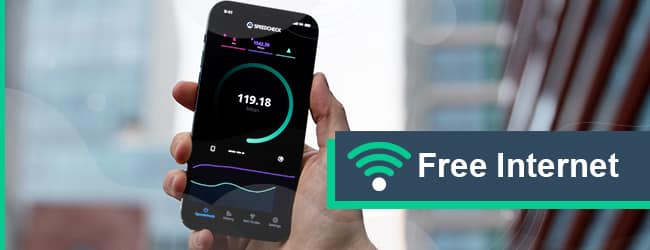20 Ways to Get Free Internet:
FreedomPop
FreedomPop has one of the most generous plans for accessing the Internet for free.
You receive a small, wireless router access point to carry with you to turn on whenever you need Internet access.
You need only pay a deposit on the device. It’s fully refundable if you return it within a year. But if you decide to keep using the device, FreedomPop keeps the deposit as payment.
Their free plan gives you 500MB of FREE data each month. However, if you need more, you can switch to one of their prepaid plans.
Their 2GB plan costs just $9.99 per month and may cost you less money than your current Internet service plan.

CheapInternet
What if you can’t find free Internet in your area?
Bookmark CheapInternet so you can keep checking for a low-income plan.
CheapInternet keeps an updated database of the cheapest – and free – Internet deals. Besides free offers, you’ll likely find something for less than $50 a month.
Click on ‘Plans By State’ at the top of the site to browse the offers in your state.
Don’t qualify for a low-income plan?
Their Internet plans are fast for as low as $9.95 a month — and even have free plans for light users.

Business Wi-Fi Hotspots
Many businesses serving the public, such as cafés, coffee shops, and restaurants, offer free Internet services. National chain stores, such as McDonald’s, Starbucks, and Walmart, also offer free Internet for their customers.
Most popular nationwide chains offer free Internet access, including:
- Apple Stores
- Panera Bread
- Whole Foods
- Starbucks
- Hotels
- Target
- McDonald’s
- Dunkin’ Donuts
- Buffalo Wild Wings
- Office Depot
- Best Buy
- Barnes and Noble
Be careful not to make impulse purchases due to the free Internet.
However, take advantage of their free Internet access since you regularly visit these places.
You’ll also find that most hotels, medical offices, hospitals, campgrounds, and even roadside rest stops provide access.
You can connect through the free Wi-Fi network, set up an account, or use a guest login system. The process is usually automatic.
Catch up on your email, world news, or relax and stream a show as you wait for a doctor, someone who is running late, or an order to be filled.
Or even start a new profitable blog in as little as 30 minutes!
InstaBridge
InstaBridge is a free smartphone app that conveniently provides Wi-Fi passwords and spots when you are on the go.
It’ll show you the nearest places with free Internet, their walking distance, and performance metrics.
It will automatically connect you to the ones that work and keep you off the ones that don’t.
A cool feature that the app has had from its earliest stages is that you can list your own home Wi-Fi to share with family and friends. You don’t have to remember a password each time someone asks.
ISP-Provided Wi-Fi Hotspots
If you already have an ISP, chances are it offers access to company-owned or affiliated Wi-Fi hotspots around town and the country.
The connection speed is high—we’re talking about 10 Mbps to 100 Mbps or even higher. You can stream music and movies, play games, browse the web, or just check your email.
Check out these ISP-provided Wi-Fi hotspots:
Even better, most of them don’t impose data caps or count the amount of data used against your account’s data cap, should you have one.
That said, finding them can be challenging, as the list can be outdated or the service unavailable in some locations.
NetZero and Juno
NetZero provides free Internet access and email. Their service is ad-supported, so you will need to download their software.
NetZero also owns Juno. They offer the same deal of 10 hours per month. So far, no policy prevents you from signing up for both to get 20 hours of free Internet access per month.
They are the only two nationwide free ISPs left.
You can also sign up for their free mobile broadband plan, which lets you access 200 MB of free monthly mobile data.
You can opt into one of NetZero’s paid plans if you need more speed. At as low as $26.95 a month, their DSL broadband plan is half the cost of the average household’s Internet bill.
Members also receive special discounts on other NetZero products and services.
Try NetZero or Juno today. It’s quick and easy to sign up under a no-risk, no-obligation policy.
Airports
Today, many Airport authorities are adding free high-speed Internet access as an amenity for travelers. Some offer access to the entire airport, while others limit access to specific terminals, waiting areas, or airline club lounges.
Free Internet at the airport means staying connected while you wait for your flight. It makes air travel fun and easier because you can check and send emails, post travel photos to Flickr or Facebook, and keep in touch with friends, family, and co-workers.
Select the “Airport Free Wi-Fi” network or use the Boingo Wi-Fi service for $4.98 1st month plan. Boingo connects you to more than 1 million public Wi-Fi hotspots worldwide.
Libraries
Most local libraries provide free Internet access for their members.
Alternatively, find free public libraries.
While you’ll have to be at the library to access the Internet, the service offers many nice features.
- It’s super quiet and relaxing, providing an environment you may not always have at home.
- Comfortable seating areas with large tables that make it perfect for working or lounging.
- You can use their computers for free, so you don’t need to bring yours.
- You can borrow free books, magazines, and DVDs to bring home.
However, library service comes with some limitations:
- Videos are restricted since quiet is essential.
- Some sites may be blocked.
Check your local library or free public libraries in your area.
Internet Service Providers
Many local ISPs don’t advertise their free Internet services.
However, they usually offer free Internet services for certain periods if you bundle and use dial-up instead of faster connections.
They also have free Wi-Fi hotspots across their service areas. You can easily access free Internet services while you’re out and about and not even know it.
Check with your current ISP for deals, then check with competing ISPs. You might uncover a low-priced Internet package that gives you everything you need with a small price tag.
Here’s a list of some of the ISPs you can consider:
Municipal Wireless Network in Your Area
Some large metropolitan areas around the world have free Internet. These municipal wireless network are citywide networks that connect businesses and government offices throughout the cities. Even small areas are beginning to catch up.
In addition, they provide free Internet access to underprivileged families and schools, especially those who can’t afford it.
Some places have restrictions, such as a limit of two free hours per day or access only outdoors and in park areas.
Check Wikipedia’s extensive list of current municipal wireless networks around the world to see if there’s one in your area and what, if any, restrictions exist.
Some of them include:
- Escondido, California – free service in the downtown area and Public Library.
- Greensboro, North Carolina – free Wi-Fi in downtown Greensboro, the Greensboro Historical Museum, The Depot, and other areas.
- Indianapolis, Indiana – free AT&T Wi-Fi downtown.
Museum
Do you have any museums near you?
If so, you might be able to hop onto their Wi-Fi occasionally.
Although some museums do have admission fees, others are free to the public.
Some of their sitting areas are nice and relaxing to work with your computer.
Their cafeterias or restaurants are great places to grab your favorite cup of tea or coffee while you browse the wen
Go to the Museum Directory, click on your state, then click on your city to find a museum. The list is in alphabetical order, making it easy for you to browse.
Free Internet for School District Students
School districts serving low-income families may qualify for free Internet access programs to enable their students to have Internet access at home.
For example, in Clarksdale, Mississippi high school students get free web access at home because the district serves families in poverty.
Since 2012, Verizon has been providing underserved students with free Internet access and devices and immersive, hands-on learning experiences through the Verizon Innovative Learning (VIL) program.
Here’s a list of schools participating in this transformative program.
Parent or guardians can access the Internet for free too.
Select Cities
Some cities already ensure that their citizens have access to water and electricity. Now, they’re considering the Internet as another essential utility that everyone should have access to.
Hundreds of cities in the world have some form of city-wide Wi-Fi, including over 80 cities in the US.
Internet is free for most (but not all) them. Some areas are limited to downtown or public transportation.
Find out if your city offers free Internet access. If it does, then you can get online at no cost any time you want.
Use Your Phone as a Hotspot
Current mobile devices have a “hotspot” features, which may also be called tethering features.
It turns your mobile device into an Internet-providing device or a router giving off an Internet signal using your mobile data.
To connect to other devices within the range, you have to turn on the hotspot feature using the instructions on your mobile device.
Now, this isn’t a great idea if you have limited mobile data every month.
You risk incurring overage charges if you exceed your data limit.
Find a Wi-Fi Free Spot
What if your city doesn’t have an airport and doesn’t offer free Internet access anywhere?
Wi-Fi Free Spot is another directory that lists all of the local free Wi-Fi hotspots.
Surprisingly, so many businesses and public places offer free Wi-Fi.
The site lists hotspots on a state-by-state basis and has specialized listings for:
- 24-hour cafes, restaurants, and fast food joints
- Local college campuses (may be password protected with access for current students only)
- Large companies (e.g., Barnes & Noble, Starbucks, McDonald’s)
- RV parks and campgrounds
- Hotels, motels, inns, and resorts
- Vacation rental properties
The website is useful if you’re traveling and want to find free Internet access in the area you’re traveling in.
But if you live close enough to one of your local businesses, you can use its public Wi-Fi at home.
Head to the Wi-Fi Free Spot website and click on the state or country you’re in to locate all the free Wi-Fi places near you.
Wi-Fi Map
Wi-Fi Map is a smartphone app that works much like the Wi-Fi Free Spot website, only it’s in app form. You can also download Wi-Fi Map to both iOS and Android.
Currently, it operates on most continents and helps you search for public hotspots when you travel. The app browses your current location to find open hotspots to join. It also gives you real-time updates on hotspots near your home.
The downside of the free app is that the free version only covers a 2.5-mile radius from your current location.
It also a feature where you can watch some ads and then get access to user-provided passwords to a Wi-Fi hotspot near you. It isn’t something you may be comfortable with, but it is an option to consider.
Bookstore
You’ll love bookstores due to their calm atmospheres. Plus, you can meet all kinds of exciting people in a bookstore!
Large chain bookstores usually have free Wi-Fi for guests and several seating areas where you can use your laptop.
Check Barnes & Noble bookstores, where AT&T is now offering free wireless Internet access to everyone.
Other bookstore with access include Bookman and Borders Books.
Hotel Lobby
Hotel lobbies are comfortable seating areas where people can socialize, lounge outside of their rooms, or wait in comfort while their rooms are being prepared.
They usually have free Wi-Fi for guests and visitors, and some hotels even have conference rooms that you might be able to utilize if you need a quiet space.
First, check with the person at the desk because not all hotels appreciate random people without a room coming in to use their Wi-Fi.
Still, it’s worth a shot when you’re in a pinch and need to access the Internet.
Ask a Neighbor
Use your good relationship with your neighbor to ask if they’d be willing to share their Internet.
However, you must be willing to offer something in return. You can mow their lawn or wash their windows in exchange for Internet access.
Alternatively, an offer to pay for the service every other month may be more convincing. You’ll only pay for access 6 months of the year, making the other 6 months completely free.
Assure them that you’ll be responsible with your Internet usage, keep the password safe, use secure websites, and not do anything illegal on the Internet.
Draw up a friendly agreement to keep everyone’s best interests protected.
Combine Free Options
You can also combine some options to maintain free Internet access. For instance, sign up for the FreedomPop plan and get your free 500MB of data at home each month.
When you’re at a chain store or business that offers free Internet access, use it. Or, make a plan to hit the local library on certain days to use their free Internet.
Combining several plans and places with free Internet access helps you access the Internet regularly without having to pay for it.
But, if you need full-time Internet access at home, then find a low-cost Internet service plan that fits your needs and your budget.
Ensuring Safety When Using Public Wi-Fi
Free Internet is convenient but comes with security risks.
So, how do you access the free Internet safely?
Here’s how.
Avoid Malware Distribution
Ensure your system is up-to-date. Older systems are more vulnerable to malware attacks.
A good anti-malware/anti-virus software costs between $19 to $40. It’s worth the price if you’re shopping online or paying bills on public Wi-Fi.
You can also use a free anti-virus program.
Turn off Wi-Fi or Bluetooth after use
Hackers use Wi-Fi or Bluetooth to access your device.
Turn off Wi-Fi in the settings of your device when you finish using public Wi-Fi.
Turn off Bluetooth if you’re not actively connecting to a Bluetooth device.
Disable File Sharing on a Laptop
Many computer users don’t even realize they have this option. Check out your computer’s settings and ensure file sharing is turned off.
Use a VPN to Ensure Privacy
A Virtual Private Network (VPN) enables you to browse the Internet anonymously without leaving a trace.
It provides a barricade between your personal information and the Internet by encrypting data that moves to and from the connection and your device.
Buy Pure VPN to get a better and secure Internet experience for as little as $3.
VPNs are extremely easy to use and available for mobile devices and tablets.
Always Forget the Network
Remember to “forget” the network after using a public Wi-Fi network.
Selecting the “remember the network or connect automatically” option enables your device to connect to the network every time it’s in range—whether you go online or not.
It’s safer to connect manually each time.
Always Use Secure Websites
One of the most important, simple things you can do is check the URL of the website.
Does it have ‘https:’ at the beginning instead of ‘http:’?
If so, it’s secure and won’t store your data.
Avoid Entering Sensitive Information
Your social security numbers, birth dates, and bank account or credit card details could be at risk.
Save anything that requires using sensitive information for when you’re using a more secure browsing environment.
Protect Your Personal Information
Install a security program such as a firewall.
- Helps block malicious sites from gaining access to your information.
- Ensures your browser doesn’t save cookies.
- Blocks sites with security vulnerabilities.
Log out of your website and e-mail accounts and don’t store your passwords in your browser.
Avoid File Sharing
Never use public Internet connections for file sharing.
Some connections block doing so automatically, but others aren’t as strict.
Turn off automatic syncing if you use Google Drive, Dropbox, or anything else. Wait to sync files yourself when you have a secure connection.
That way, you’ll keep all your important documents, photos, videos, and other media safe from the wrong hands or eyes.
Legal Ways to Get Free Internet
Weigh all options carefully before you cancel your internet plan to rely exclusively on the free Internet.
Be prepared to be creative and flexible!
